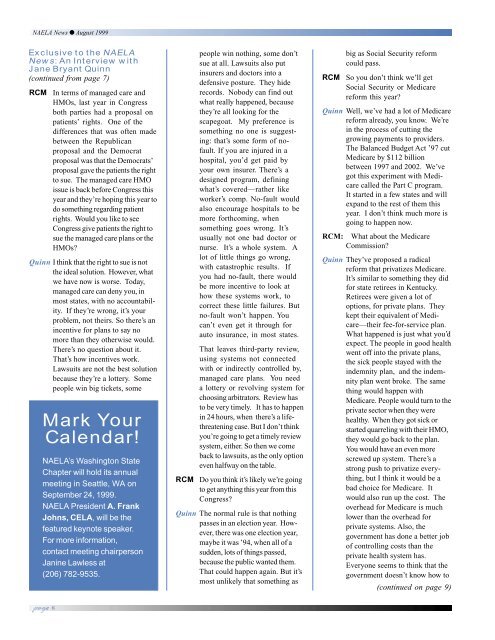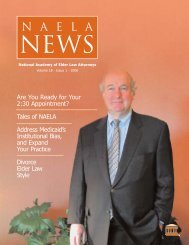NAELA News August, 1999 - National Academy of Elder Law ...
NAELA News August, 1999 - National Academy of Elder Law ...
NAELA News August, 1999 - National Academy of Elder Law ...
Create successful ePaper yourself
Turn your PDF publications into a flip-book with our unique Google optimized e-Paper software.
<strong>NAELA</strong> <strong>News</strong> ● <strong>August</strong> <strong>1999</strong><br />
Exclusive to the <strong>NAELA</strong><br />
<strong>News</strong>: An Interview with<br />
Jane Bryant Quinn<br />
(continued from page 7)<br />
RCM<br />
In terms <strong>of</strong> managed care and<br />
HMOs, last year in Congress<br />
both parties had a proposal on<br />
patients’ rights. One <strong>of</strong> the<br />
differences that was <strong>of</strong>ten made<br />
between the Republican<br />
proposal and the Democrat<br />
proposal was that the Democrats’<br />
proposal gave the patients the right<br />
to sue. The managed care HMO<br />
issue is back before Congress this<br />
year and they’re hoping this year to<br />
do something regarding patient<br />
rights. Would you like to see<br />
Congress give patients the right to<br />
sue the managed care plans or the<br />
HMOs?<br />
Quinn I think that the right to sue is not<br />
the ideal solution. However, what<br />
we have now is worse. Today,<br />
managed care can deny you, in<br />
most states, with no accountability.<br />
If they’re wrong, it’s your<br />
problem, not theirs. So there’s an<br />
incentive for plans to say no<br />
more than they otherwise would.<br />
There’s no question about it.<br />
That’s how incentives work.<br />
<strong>Law</strong>suits are not the best solution<br />
because they’re a lottery. Some<br />
people win big tickets, some<br />
Mark Your<br />
Calendar!<br />
<strong>NAELA</strong>’s Washington State<br />
Chapter will hold its annual<br />
meeting in Seattle, WA on<br />
September 24, <strong>1999</strong>.<br />
<strong>NAELA</strong> President A. Frank<br />
Johns, CELA, will be the<br />
featured keynote speaker.<br />
For more information,<br />
contact meeting chairperson<br />
Janine <strong>Law</strong>less at<br />
(206) 782-9535.<br />
people win nothing, some don’t<br />
sue at all. <strong>Law</strong>suits also put<br />
insurers and doctors into a<br />
defensive posture. They hide<br />
records. Nobody can find out<br />
what really happened, because<br />
they’re all looking for the<br />
scapegoat. My preference is<br />
something no one is suggesting:<br />
that’s some form <strong>of</strong> n<strong>of</strong>ault.<br />
If you are injured in a<br />
hospital, you’d get paid by<br />
your own insurer. There’s a<br />
designed program, defining<br />
what’s covered—rather like<br />
worker’s comp. No-fault would<br />
also encourage hospitals to be<br />
more forthcoming, when<br />
something goes wrong. It’s<br />
usually not one bad doctor or<br />
nurse. It’s a whole system. A<br />
lot <strong>of</strong> little things go wrong,<br />
with catastrophic results. If<br />
you had no-fault, there would<br />
be more incentive to look at<br />
how these systems work, to<br />
correct these little failures. But<br />
no-fault won’t happen. You<br />
can’t even get it through for<br />
auto insurance, in most states.<br />
That leaves third-party review,<br />
using systems not connected<br />
with or indirectly controlled by,<br />
managed care plans. You need<br />
a lottery or revolving system for<br />
choosing arbitrators. Review has<br />
to be very timely. It has to happen<br />
in 24 hours, when there’s a lifethreatening<br />
case. But I don’t think<br />
you’re going to get a timely review<br />
system, either. So then we come<br />
back to lawsuits, as the only option<br />
even halfway on the table.<br />
RCM Do you think it’s likely we’re going<br />
to get anything this year from this<br />
Congress?<br />
Quinn The normal rule is that nothing<br />
passes in an election year. However,<br />
there was one election year,<br />
maybe it was ’94, when all <strong>of</strong> a<br />
sudden, lots <strong>of</strong> things passed,<br />
because the public wanted them.<br />
That could happen again. But it’s<br />
most unlikely that something as<br />
big as Social Security reform<br />
could pass.<br />
RCM So you don’t think we’ll get<br />
Social Security or Medicare<br />
reform this year?<br />
Quinn Well, we’ve had a lot <strong>of</strong> Medicare<br />
reform already, you know. We’re<br />
in the process <strong>of</strong> cutting the<br />
growing payments to providers.<br />
The Balanced Budget Act ’97 cut<br />
Medicare by $112 billion<br />
between 1997 and 2002. We’ve<br />
got this experiment with Medicare<br />
called the Part C program.<br />
It started in a few states and will<br />
expand to the rest <strong>of</strong> them this<br />
year. I don’t think much more is<br />
going to happen now.<br />
RCM: What about the Medicare<br />
Commission?<br />
Quinn They’ve proposed a radical<br />
reform that privatizes Medicare.<br />
It’s similar to something they did<br />
for state retirees in Kentucky.<br />
Retirees were given a lot <strong>of</strong><br />
options, for private plans. They<br />
kept their equivalent <strong>of</strong> Medicare—their<br />
fee-for-service plan.<br />
What happened is just what you’d<br />
expect. The people in good health<br />
went <strong>of</strong>f into the private plans,<br />
the sick people stayed with the<br />
indemnity plan, and the indemnity<br />
plan went broke. The same<br />
thing would happen with<br />
Medicare. People would turn to the<br />
private sector when they were<br />
healthy. When they got sick or<br />
started quarreling with their HMO,<br />
they would go back to the plan.<br />
You would have an even more<br />
screwed up system. There’s a<br />
strong push to privatize everything,<br />
but I think it would be a<br />
bad choice for Medicare. It<br />
would also run up the cost. The<br />
overhead for Medicare is much<br />
lower than the overhead for<br />
private systems. Also, the<br />
government has done a better job<br />
<strong>of</strong> controlling costs than the<br />
private health system has.<br />
Everyone seems to think that the<br />
government doesn’t know how to<br />
(continued on page 9)<br />
8










